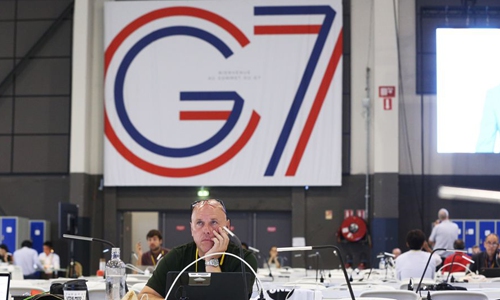Russia likely to decline any G7 invitation
By Cui Heng Source:Global Times Published: 2020/6/5 13:08:40

Journalists work at the G7 summit press center in Biarritz, France on Aug 25, 2019. Photo: Xinhua
US President Donald Trump expressed his intention to expand the Group of Seven (G7) to invite leaders of Russia, India, Australia and South Korea to the annual summit, which he has postponed until September. His proposal to include Moscow in the forum has caught global attention.
It was not unexpected that Trump would propose inviting the three other countries, as Australia and South Korea have been two of the US' closest allies and India is the "largest democracy in the world" which the US has been trying to strengthen ties with.
Russia in 2014 was cast out of the Group of 8 due to its involvement in the 2014 Crimea crisis. Up to now, signs of easing US-Russia tensions have been absent. Although Trump's proposed invitation to Russia is rational, it comes unexpectedly. The international community is eager to hear Russian President Vladimir Putin's decision.
Some of the US' close allies in the bloc, such as the UK and Canada, have expressed their opposition toward Russia's return as there has been no "evidence of changed behavior which would justify [Russia's] readmittance," British Prime Minister Boris Johnson's spokesman said. Western countries' divergence when it comes to Russia embodies a rift that is widening in the Trump era.
In response, Russian Foreign Ministry Spokesperson Maria Zakharova on Tuesday said the proposal to expand the G7 summit is "a step in the right direction," but it will fail to "provide a truly universal representation." She continued, "It is hardly possible to implement serious undertakings of global significance without China's participation."
Moscow's cold manner toward Trump's invitation partly results from Russia's attempt to shun any unnecessary impact on its ties with China. More significant causes are Russia's consideration of the international political landscape, its national identity and its stance in major power competition in the post-pandemic age. Its response was a deliberate decision from Russian policymakers, affected by three factors.
First, Russia is definitely and clearly aware that the international balance of power has been undergoing significant change. Western countries' capability of dominating international politics has been waning. The G7 is not capable of governing global affairs. Against this background, Russia's return to the group becomes meaningless. The West once firmly dominated global politics. Yet the rise of emerging powers has broken Western countries' dominance, and the coronavirus pandemic is accelerating the transfer of international political power. In this context, Russia believes the bloc can no longer meet the requirements of the times, nor can it lead the direction of international politics as it did in the immediate aftermath of the Cold War. Russia clearly recognizes that without the participation of China, the world's second-largest economy, any multilateral organization lacks the capability of global governance.
Second, Russia does not want to return to the 1990s when it had to follow Western countries. After the fall of the Soviet Union, Russia completely leaned toward the West but was not accepted, and its national interests were greatly undermined. This history of humiliation still stirs the nerves of Russians today.
Russia is not what it used to be. If Russia wants to join any Western group today, Western countries can hardly treat it equally. Its membership in the G8 in the 1990s was a glorious embrace from Western countries, but if it returns now, it would mean Russia is giving up its major power position. This is an option that Russian leaders and people cannot accept.
Third, Russia may take into consideration China-Russia relations. It is obvious that Trump's intended G7 expansion is aimed at China. The national strength and global governance ability of China exceeds those of India and Russia. Trump did not think about global governance but only political motivations.
Russia is well aware of the US' intentions and pointed out that the G7 lacks representation without China. For Russia, adopting a China-friendly approach suits its interests more. Andrey Kortunov, director general of the Russian International Affairs Council, once said Russia would side with China because the US cannot provide anything more valuable than the China-Russia strategic partnership.
That Russia will decline to join the G7 is an inevitable outcome. After all, the G7 is an obsolete mechanism. Nonetheless, that does not mean Russia will form an anti-West alliance with China. For a major power like Russia, when its declining national strength means it is not a decisive power, maintaining independence and declining to join any politically inclined group is the best option.
Since the US-launched trade war against China in 2019, Russian elites have raised new ways of thinking about Russia's future diplomatic strategy, notably the concept of multilateral strategic balance. Russia hopes to become a key player in maintaining the major power balance, which fits Russia's interests in the current times.
The author is a post-doctorate researcher from the Centre for Russian Studies, East China Normal University. opinion@globaltimes.com.cn
Posted in: VIEWPOINT